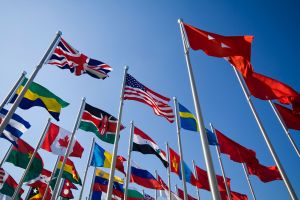Opinion surveys conducted in both the United States and Russia reflect similar disappointment and continued mistrust among the general publics.
Key Findings
Many observers expected a reset in US-Russia relations with the election of Donald Trump. However, a year into the Trump administration, the United States has placed additional sanctions on Russia and identified Russia as a key threat in the 2018 National Security Strategy. A Kremlin spokesperson described current US-Russian relations as one of the biggest disappointments of 2017. Opinion surveys conducted year-end in both the United States and Russia reflect similar disappointment and continued mistrust among the general publics.
What a Difference a Year Makes
A year ago, the publics in both Russia and the United States expected US-Russia relations to turn a corner. A Levada survey conducted in January 2017 found a plurality of Russians expecting bilateral relations would improve (46%) with the election of Donald Trump (see figure). A November 2016 FOM survey even found that Russians expected Trump would recognize Crimea as part of Russia and lift the sanctions on Russia (70% each). In the United States, a December 2016 Bloomberg public opinion survey reported that six in ten Americans (62%) thought relations would improve within the next four years.
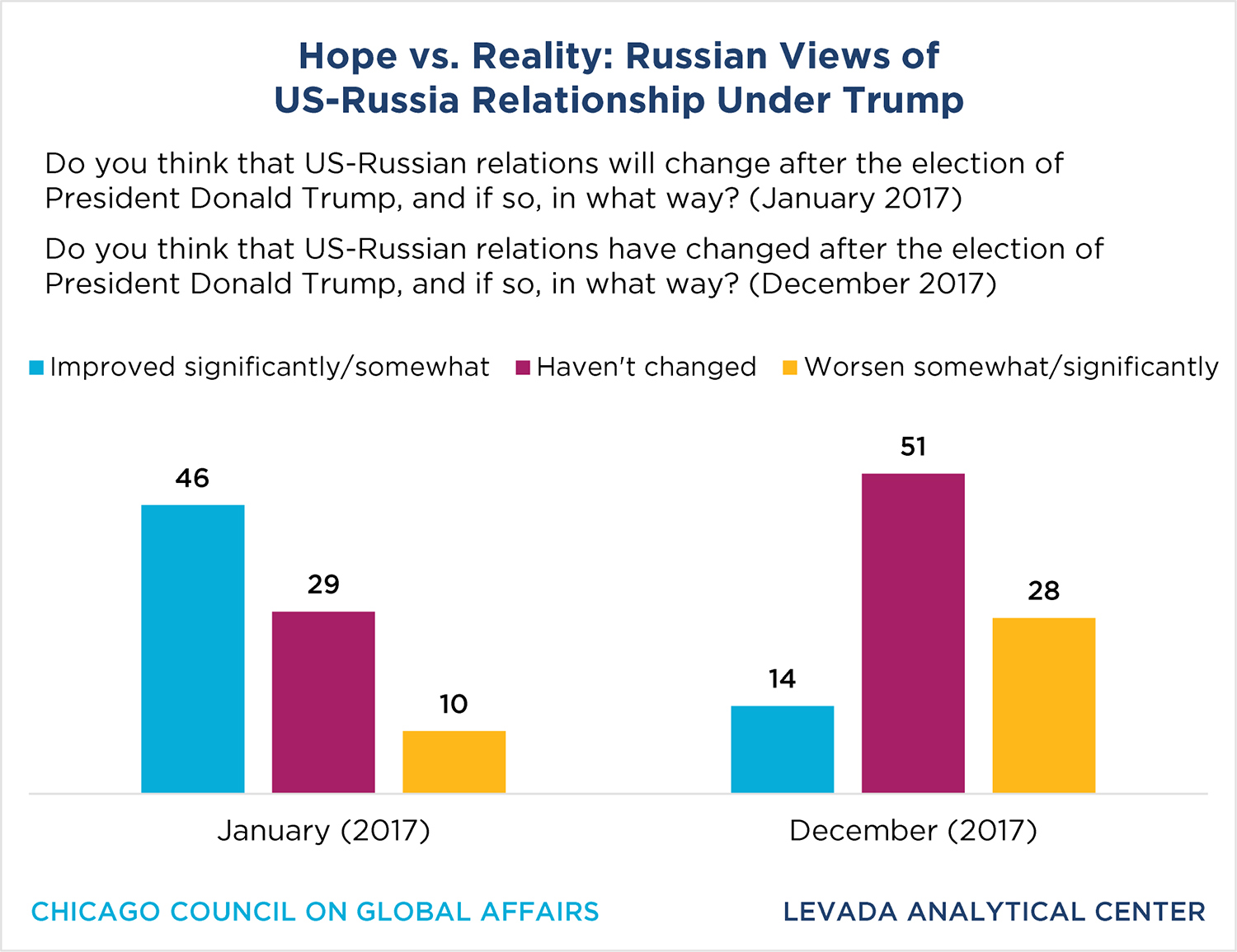
But today, Chicago Council and Levada surveys find that public expectations have been dashed. Half of Russians (51%) say that US-Russia relations have not changed after the election of Donald Trump and 28 percent say they have worsened. Only fourteen percent say relations have improved (see figure). Moreover, only a quarter of Russians express a favorable opinion of the United States (24% favorable, 60% unfavorable), similar to opinion in 2016 (when 25 percent expressed a favorable view).1 And among those who believe that Russia has enemies (66% overall), half name the United States as an enemy (53% of all those giving a first mention; 35% of the overall Russian public).
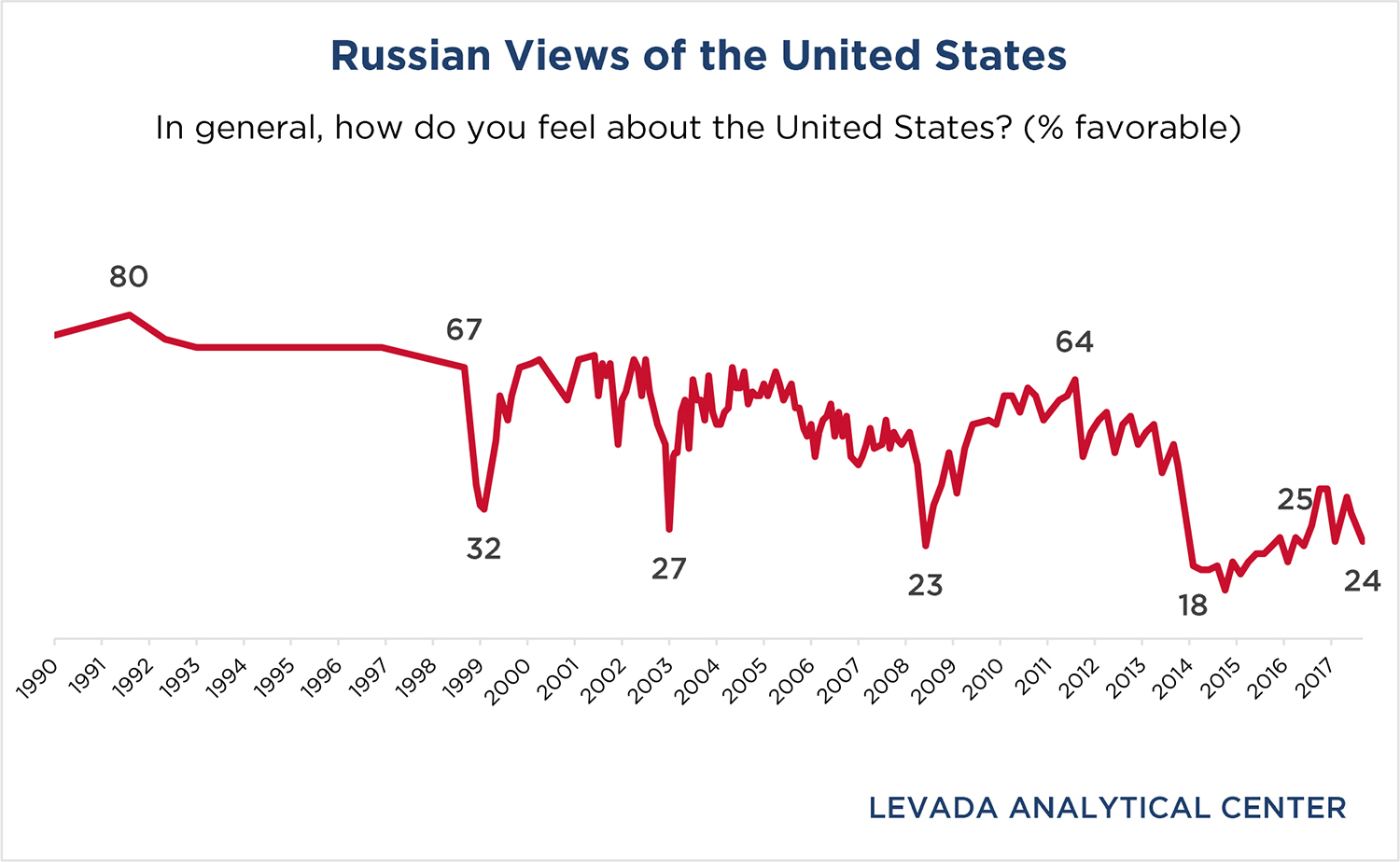
In the United States, American views of Russia continue to be negative at levels not seen since the Cold War. On a temperature scale—where 0 degrees represents a very cold, unfavorable feeling and 100 degrees represents a very warm, favorable feeling—Americans rate Russia an average of 31 degrees.2 Opinion of Russia is even cooler among Democrats (28°, Republicans 34°, Independents 35°). Perceptions of Russia as an adversary to the United States have also increased slightly. A Gallup poll from last June found that 52 percent of Americans described Russia as an adversary (6% ally), up from 46 percent in January 2017 (9% ally). And the 2017 Chicago Council Survey conducted in June-July 2017 found that confidence in Russia to deal responsibly with world problems remains low (28%, 27% in 2015).
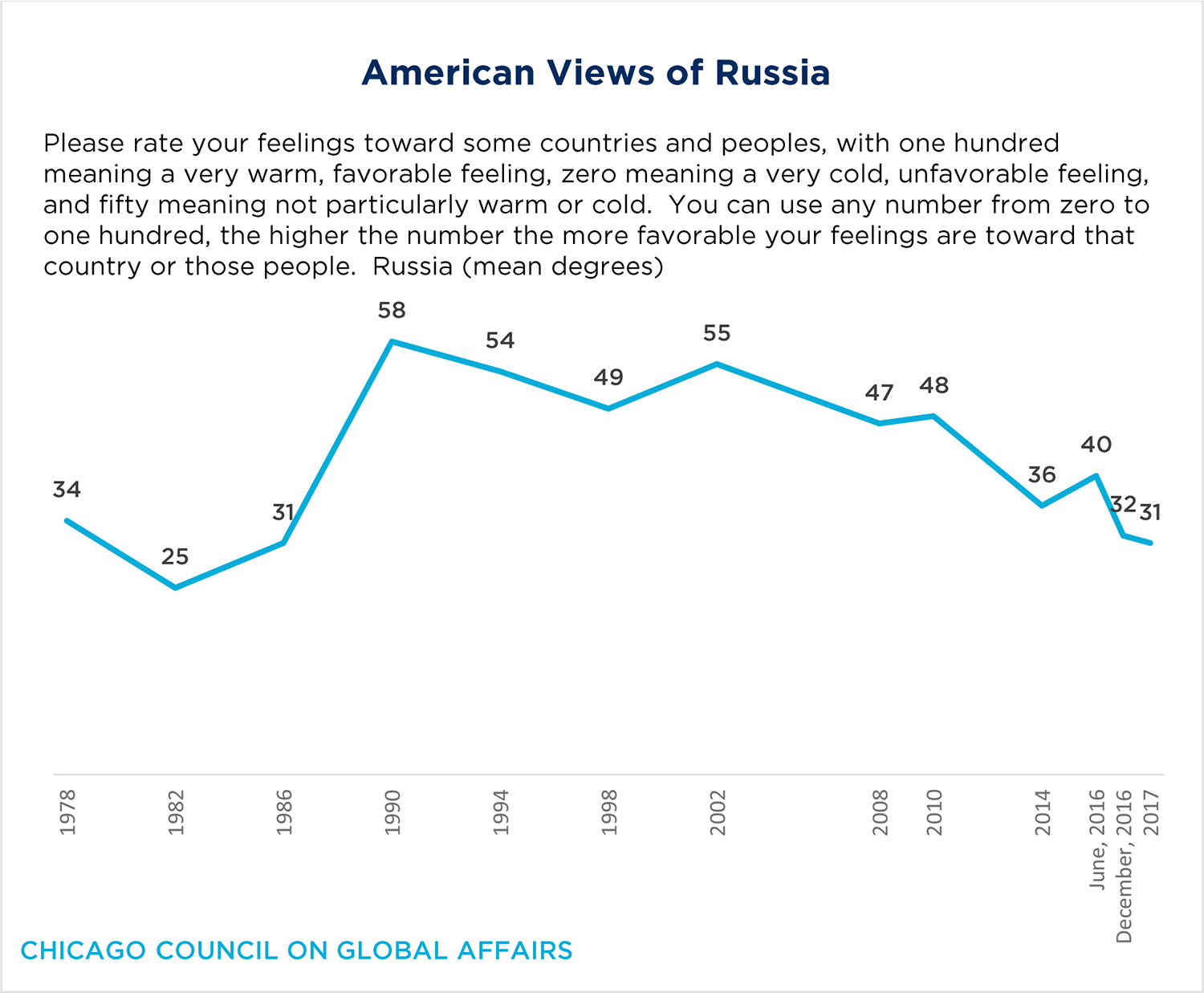
Mutual Distrust
The Trump administration's National Security Strategy states that Russia is trying to “weaken the credibility of America’s commitment to Europe, undermine transatlantic unity, and weaken European institutions and governments.” At the same time, the Russian government has accused the United States—particularly when Hillary Clinton was Secretary of State—of rabble rousing in Russia.
American and Russian publics echo these accusations of interference. Eight in ten Russians believe that the United States tries to influence Russia’s domestic affairs (78%) and that the United States is trying to undermine Russia’s international influence and power (81%). Perhaps because of these suspicions, a narrow majority says that Moscow should try to limit US power (52%) rather than undertake friendly cooperation with the United States (47%), though fewer Russians feel this way now than a year ago (when 68 percent thought their country should attempt to limit US influence). Moreover, Russians widely believe that Russia needs to improve relations with the US and other Western countries (75% at least a fair amount).
Only 31 percent of Russians believe their own country tries to influence the domestic affairs in the United States, but Americans think otherwise. In total, at least seven in ten Americans think that Russia tries to influence the domestic affairs of the United States (69%) and that Russia is actively working to undermine US international influence and power (74%).3 In a stark reversal from opinion in 2016, the 2017 Chicago Council Survey conducted in June-July 2017 found that more Americans said the United States should actively work to limit Russia’s power (53%, 43% undertake friendly cooperation). At the same time, Americans are not naïve about American influence, with a majority believing that the United States tries to influence domestic affairs in Russia (55%).
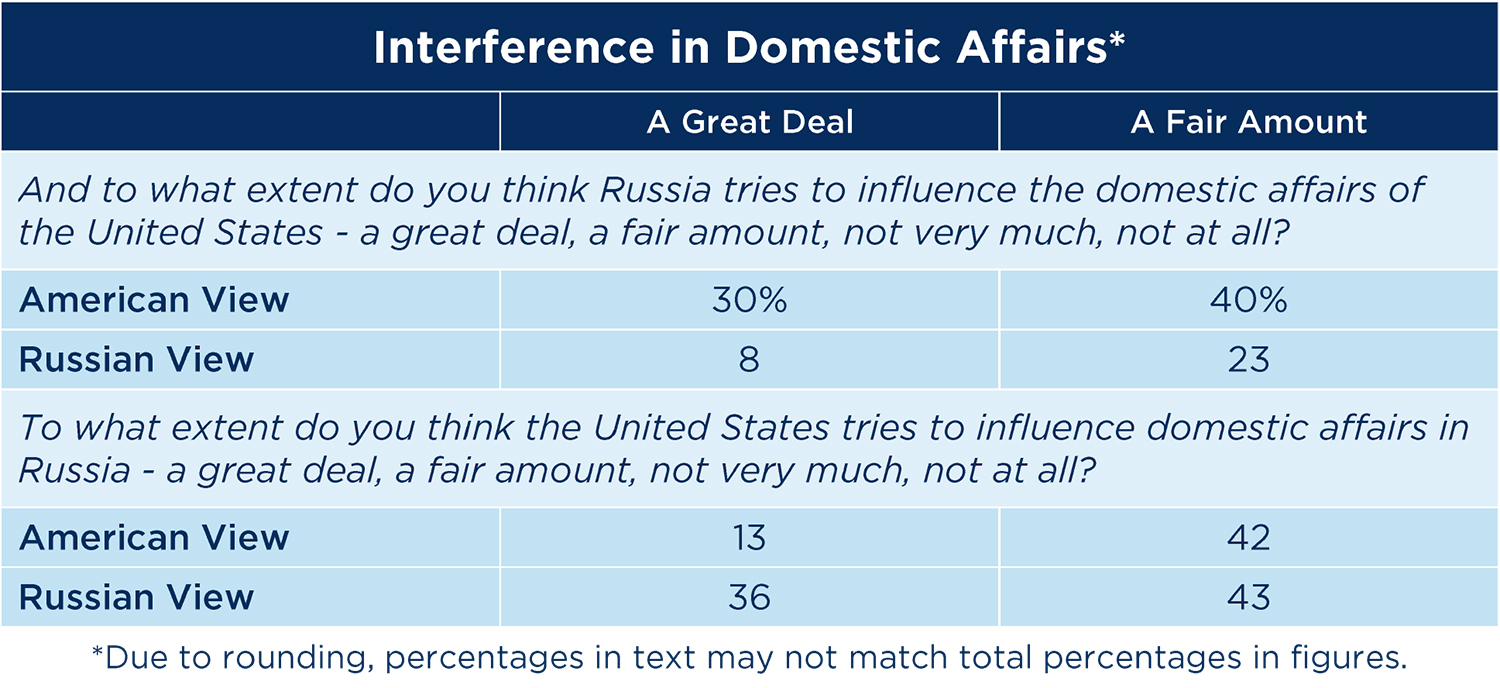
Both Publics See Growing Importance for Russia, Less Influence from United States
The Russian and American survey results seem to reflect public acknowledgement of Moscow’s growing presence on the world stage. Since 2014 Russia has had an increasing impact on international affairs particularly due to its forays into the conflicts in Ukraine and Syria. A majority of Russians (56%) and a plurality of Americans (41%) agree that Russia plays a more important role in the world today than it did ten years ago.4 In addition, while still a minority position, more Americans see Russian military power as a critical threat to the United States now (42% in June-July 2017) than when last asked in 2002 (23%).5
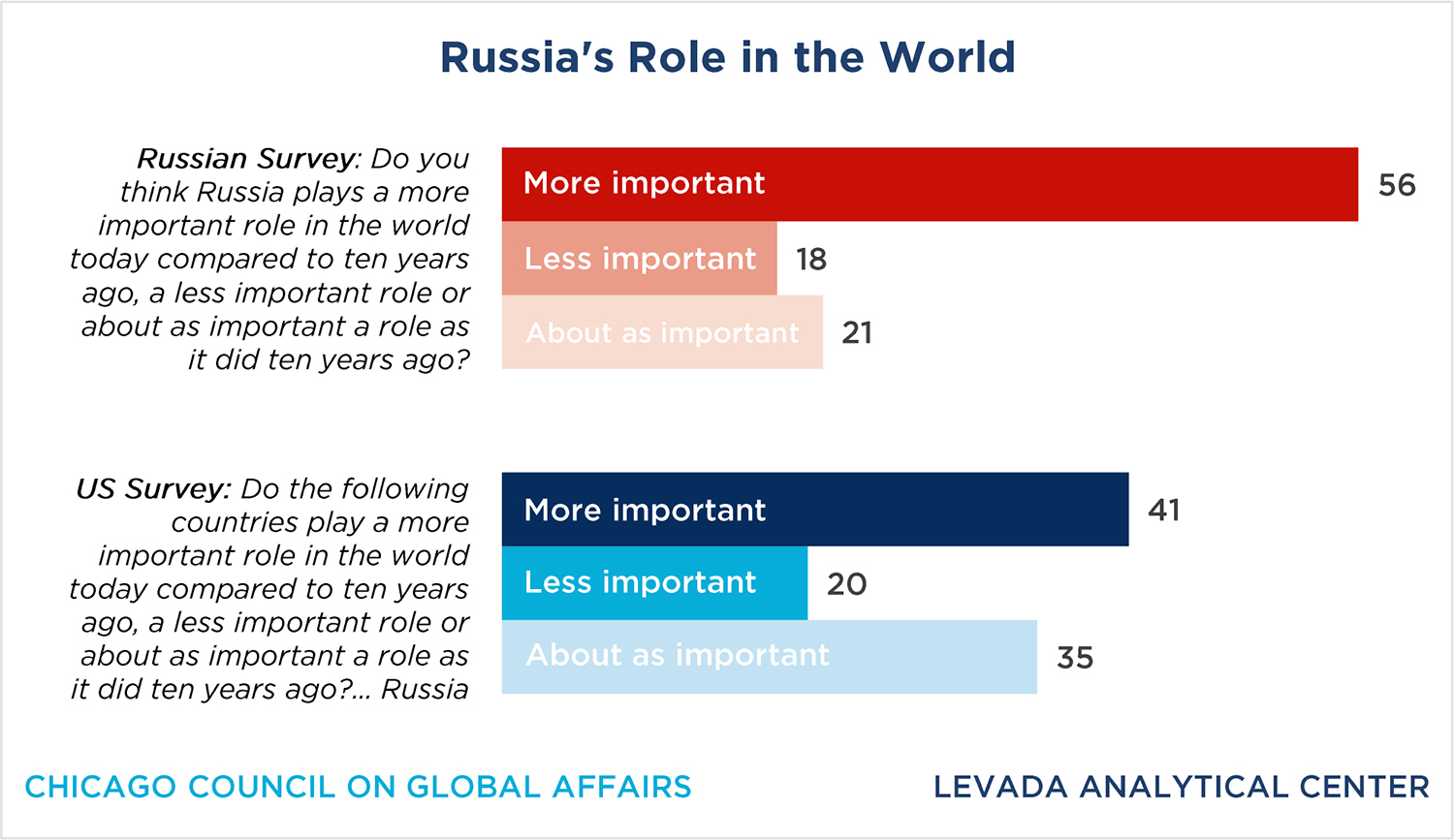
Conversely, neither Americans nor Russians say that the United States is more important today than it was ten years ago. Nearly half of Americans think the United States is less important today (47%) and another third think it is as important (31%; see figure).6 A slight plurality of Russians says the United States is about as important today as ten years ago (38%), though a third also say that the United States is less important (32%). In addition, only a third of Russians describe US power and influence as a critical threat (35%) to their country. Even fewer view the NATO security alliance (24%) and the US sanctions (15%) as critical threats to Russia.
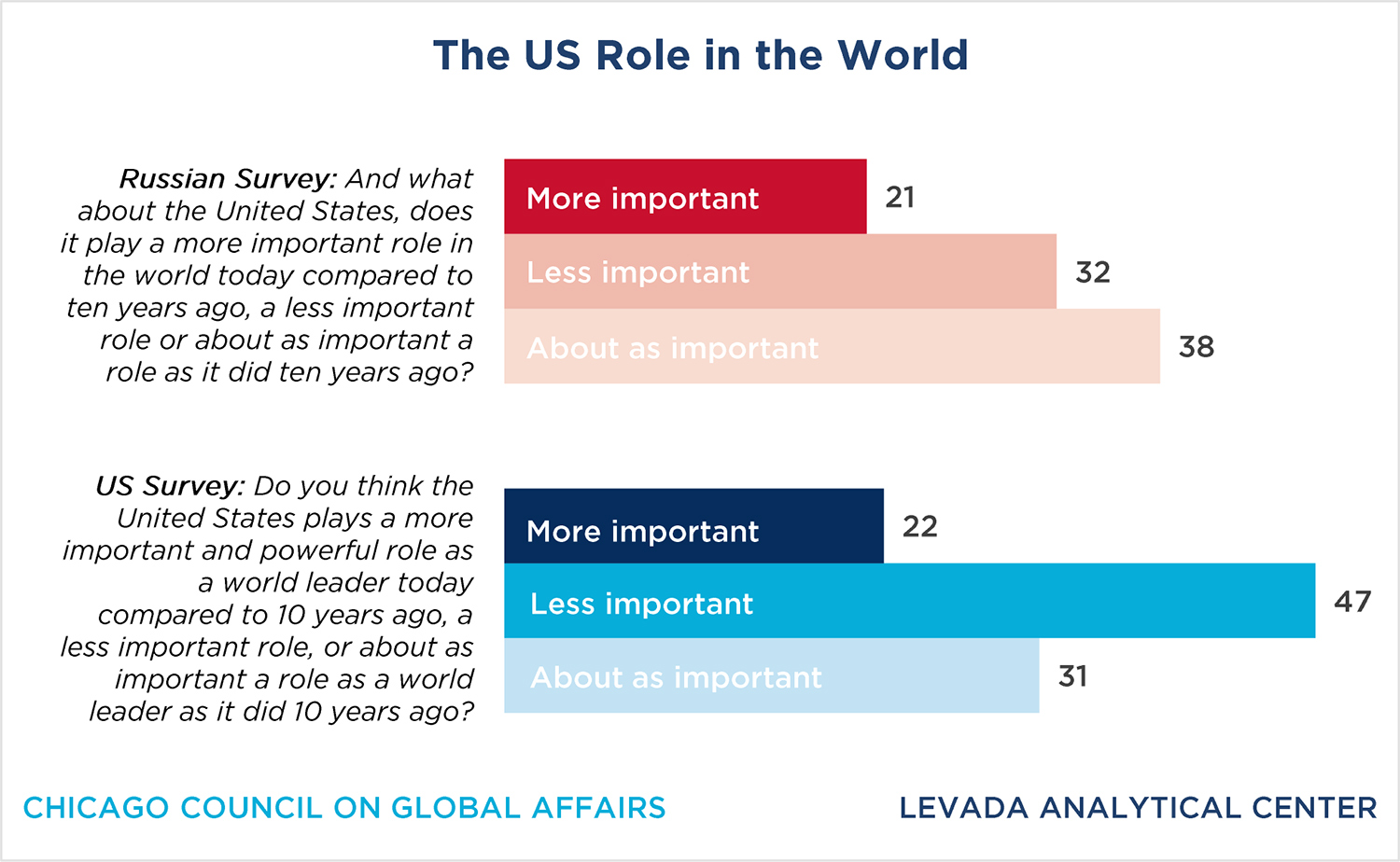
Improved Relations Less Likely Now
Since fielding this survey, the Kremlin has criticized the newly released US National Security Strategy (NSS) calling US policy "imperialistic," with the goal of "maintaining a unipolar world order." This is likely because the NSS named Russia a top threat to the United States and charged Moscow with interfering “in the domestic political affairs of countries around the world.” While neither side has said as much, official hopes for rehabilitating the US-Russian relationship may go the way of public opinion.
Methodology
The analysis in this report is based on data from the joint 2017 Chicago Council-Levada Analytical Center survey on Russian and American Attitudes conducted in December 2017. The 2017 Chicago Council Survey of the American public on foreign policy, conducted in the summer of 2017, is also cited.
The Chicago Council Survey on issues related to Russia was conducted by GfK Custom Research using their national online omnibus service, KnowledgePanel™, between December 1-3, 2017 among a weighted national sample of approximately 1,000 American adults, 18 years of age or older, living in all 50 US states and the District of Columbia. The margin of error is ±3 percentage points.
The Levada Center survey was conducted between December 1-5, 2017 by the Levada-Center (Levada Analytical Center) with face-to-face interviews conducted among a representative sample of 1,605 Russians aged 18 years and older, living in eight federal districts of the Russian Federation (including Crimea). Inside each district the sample is distributed among five strata of settlements proportionally to the number of population living in them in age of 18+ years. The margin of error is ±3.4 percentage points.
The 2017 Chicago Council-Levada Analytical Center Joint Survey on Russian and American Attitudes is made possible by the generous support of the Carnegie Corporation of New York.
Results are also cited from the 2017 Chicago Council Survey was conducted by GfK Custom Research using their large-scale, nationwide online research panel between June 27 and July 19, 2017 among a weighted national sample of 2,020 adults, 18 years of age or older, living in all 50 US states and the District of Columbia. The margin of error is ±2.4 percentage points.
- 1Russians are similarly unfavorable about Ukraine (28% favorable, 56% unfavorable) and the European Union (28% favorable, 54% unfavorable). They are much more positive about Japan (48% favorable, 30% unfavorable).
- 2Americans rate Russia the lowest among China (40⁰), Mexico (51⁰), and the European Union (57⁰).
- 3As reported previously, 61 percent of Americans think Russia tried to influence the outcome of the 2016 US presidential elections.
- 4A majority of Americans also view China as more important today than ten years ago (58% more important), while a plurality say the European Union is about as important (43%, with 30% less important; see appendix for full trend results). This suggests that Americans think the US and European positions in the world are shifting relative to other powers. Russians were not asked about China and the European Union.
- 5 And for the first time in Chicago Council surveys, a majority of Americans said they would support using US troops to defend a Baltic NATO member if Russia attacked (52%).
- 6The last time a majority Americans saw the United States as playing a more important role than 10 years ago was in 2002 (55%). See appendix tables for full results.






